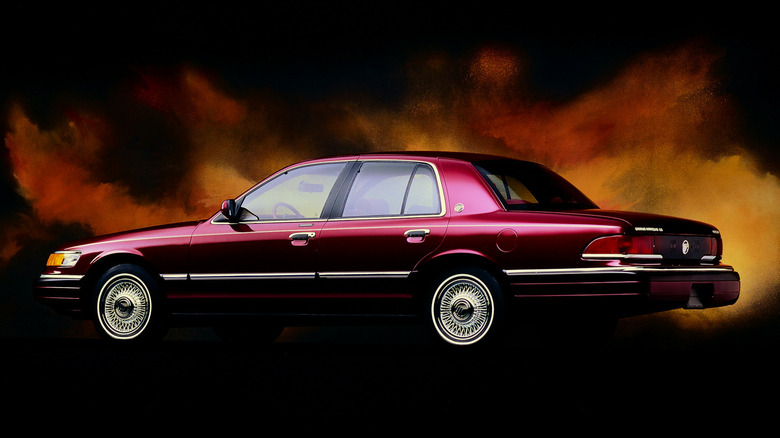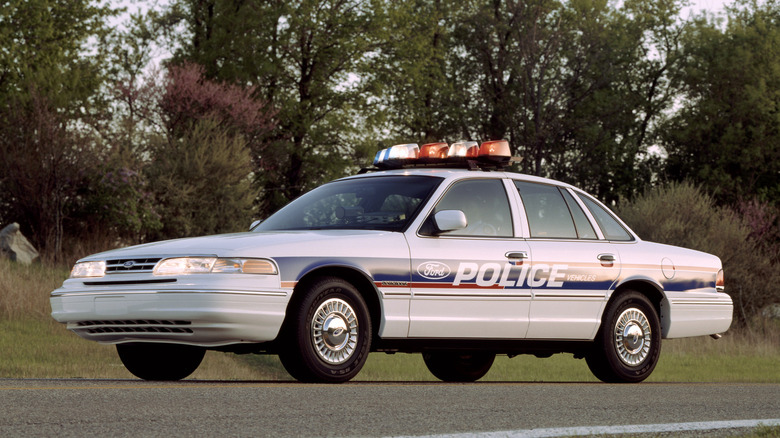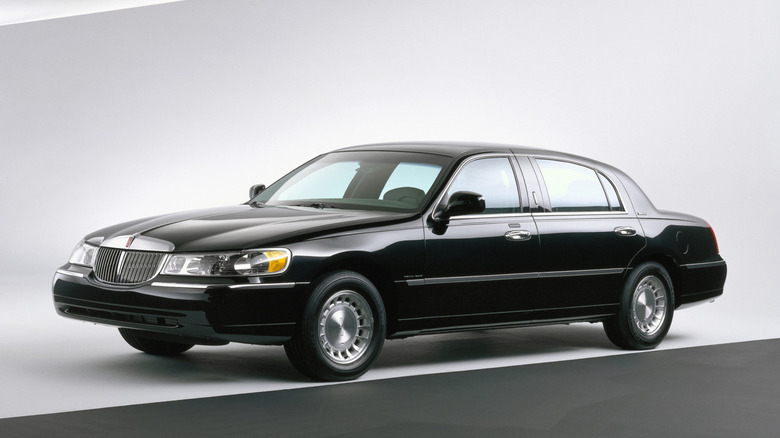How Ford's Panther Platform Became An Everyday Hero And Future Classic
To gearheads with a lead foot, seeing a nondescript Ford Crown Victoria parked on the side of the road, or show up in their rear-view mirror, is enough to ease off the accelerator a little bit. To others, that same Ford is a relief. Although Ford stopped production of the Crown 'Vic well over a decade ago, it's a car that has become linked with law enforcement as seemingly every police and sheriff's department in the country used the Ford as its main squad car for decades.
In fact, Ford made special equipment packages specifically for the Crown Victoria police cruiser. Numerous other cars have seen police duty over the years, but none are as ubiquitous as the Ford. In addition to law enforcement, the Crown Victoria has seen extensive use as a taxi.
In its final iteration before it was discontinued in 2011, the Crown Victoria shared internals with two other cars from Ford Motor Company's stable: the Lincoln Town Car, and the Mercury Grand Marquis. Underneath all of those cars is Ford's Panther platform.
From the late 70s until the 2010s, Panther platform cars were synonymous with two very different sides of the automotive spectrum: luxury, and the law. More recently, Panther platform cars are renowned for being one of the cheapest ways to get rear-wheel drive V8 power and rock-steady reliability.
Jack of all trades
The Panther platform was first launched in 1979, and served as the underpinnings for the then-totally redesigned Ford LTD and Mercury Marquis. According to Ford, the engineers pulled out all the stops and used cutting edge computer technology of the time to design the Marquis. For the LTD, Ford claimed the new platform and design allowed the car to ride smoother than a Rolls-Royce and contain all the comforts of a European luxury car for Ford prices.
By the 1990s, Panther platform cars became the Crown Victoria, Grand Marquis, and Town Car most are familiar with today, and stayed largely the same until the platform was discontinued around two decades later. There is no Universal Car, but Ford got fairly close with its Panther cars.
The Crown Victoria could serve as a police cruiser, taxicab, and cheap proto-muscle car. The Mercury Grand Marquis had seating for six, which put it firmly in "family car" and "retiree" territory. Lastly, the Lincoln Town Car was stately and handsome enough to serve as a chauffeur car or luxury sedan.
Cheap V8 power
It's a testament to Ford's engineering ability that it can make a platform that served (and continue to serve) in so many roles over more than three decades. The 4.6-liter Modular V8 that powered later Panthers was never a showstopper, and hovered around 200 horsepower for most of its life. For the 2003 and 2004 model years, Mercury offered the 300+ horsepower Marauder, itself a souped-up Panther car. But overall, the cars never broke any land speed records.
Panther platform cars were like a local competent fire department (that could've also used Crown Victoria cars). It's reliable, trustworthy, has enough strength to do the job, and it will do its best to never let you down.
Today, in 2023, there are dozens of ex-law enforcement Crown Victorias for sale on government auction sites, many with fairly low miles for the age. It's a tempting option for a dirt-cheap, V8-powered car for people who don't want the muscle car premium. For many, it's an attainable dream car. When the Ford Panther platform was new, a V8-powered rear-wheel drive family sedan wasn't anything special. In 2011, it was a dinosaur in the most endearing way.


